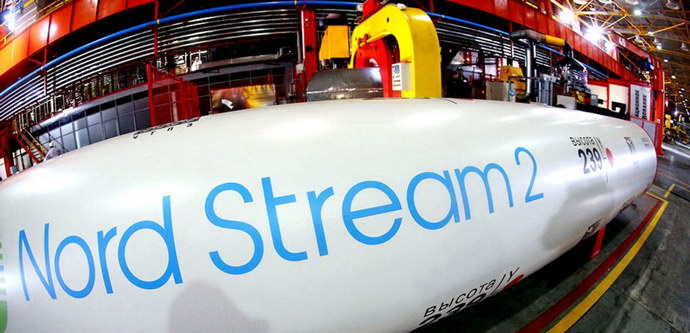Sanctions, the Fortuna and “climate protection”: what’s new in the Nord Stream 2 standoff?
The unfinished gas pipeline from Russia to Germany, which thanks to U.S. sanctions has been “on pause” all the way since December of last year, remains in the focus of international attention. Despite the frozen construction, the governments of neither Russia nor Germany gave up on it. With a similar vigor, the United States remains persistent and methodical in continuing what they started.

The unfinished gas pipeline from Russia to Germany, which thanks to U.S. sanctions has been “on pause” all the way since December of last year, remains in the focus of international attention. Despite the frozen construction, the governments of neither Russia nor Germany gave up on it. With a similar vigor, the United States remains persistent and methodical in continuing what they started.
Beginning from 11 November, media actively disseminated a Bloomberg report about the preparation of fresh sanctions targeting insurance and certification companies working with Nord Stream 2.
The report on preparation of fresh sanctions dealt a serious information blow to the project. Moreover, it mentioned that the potentially involved companies and persons are being contacted and warned about possible consequences.
On 26 November, media reported that Norwegian certification company DNV GL stopped doing business with Nord Stream 2 operator company. The Norwegians reasoned their decision by the U.S. State Department’s statement published on 20 October, which issued an extended guidance concerning implementation of existing sanctions.
This event coincided in time with another important factor: according to information by Marine Traffic web portal, Russian pipe-laying ship MV Akademik Chersky left German port Mukran and sailed to Kaliningrad, Russia.
On 9 November, the U.S. House of Representatives voted for the defense budget that contains items concerning additional sanctions against companies providing insurance or licensing services for Nord Stream 2. The draft budget received enough votes to overcome, if necessary, a possible presidential veto.
On the other hand, the adherents of Nord Stream 2 struck back as well.
Firstly, Nord Stream 2 AG announced the plan to resume in the coming weeks the construction work that was halted a year ago and lay a 2.6-km section on each of the pipeline’s branches within Germany’s economic zone using MV Fortuna, a specialized barge flying the Russian flag.
This decision looks more like an image-boosting step rather than the completion of the gas pipeline project, an attempt to show that the project is still alive. These 2.6 km will not solve the problem of the approximately 160 unbuilt kilometers, and it is nearly impossible to imagine construction in Denmark’s exclusive economic zone without the appropriate certification and new permits. Most likely, this activity in the Baltic Sea is intended to check how U.S. sanctions actually work.
Secondly, media reported that the government of the German state Mecklenburg-Vorpommern wants to create a special fund that could help bypass the restrictions imposed by sanctions. The idea is that the Climate Protection Fund, having designated Nord Stream 2 as an important component for environmental protection, is going to buy the goods and services which the gas pipeline needs and give them to its newly-established enterprise, which will work with the project’s operator.
However, it is highly doubtful that such actions will be able to escape the existing sanctions (in particular, because of the more detailed applicability of these sanctions laid down in the extended guidance). Moreover, the package of fresh sanctions included to the draft U.S. defense budget may include safeguards against schemes like that.
Thirdly, according to media reports, Gazprom signed a long-term contract with Austrian company OMV on gas deliveries to Germany (6 bcm per year during 15 years). This way, Gazprom is probably trying to circumvent the restrictions imposed on Nord Stream 2 (for according to the updated EU Gas Directive, the Russians are required to provide third parties (i.e., buyers) with access to the gas pipeline).
This volume and contract won’t be enough to ensure conformity with European rules. Nevertheless, this step can also be interpreted as an attempt by Gazprom to assure everybody, particularly their partners in this project, that Nord Stream 2 will eventually be launched.
So, who scored a strategic victory?
The dropout of the project’s key partner, certification company DNV GL, is comparable in terms of significance with the decline by Allseas Group S.A. to finish the pipeline’s construction. Like the underwater pipe-laying, certification of this work is a unique service and the companies providing this service are very concerned with their reputation, because international trust and recognition is their most valuable asset.
Moreover, even despite the attempts to invent sanctions-circumventing schemes, the very fact of including additional sanctions to the draft U.S. defense budget is a key. Most likely, the American legislators will not tolerate these bypassing maneuvers.
However, there is one front – regional – where Nord Stream 2 has scored a tactical victory. The uncompromising support for this project in Mecklenburg-Vorpommern creates a deadlock for the federal government of Germany, because any move will cause discontent on one or the other side. There is no safe solution, which explains Berlin’s silence, nor there a better way to show the effectiveness of the Russian lobby.
In this situation, more active stance of the EU as a strong player would have been helpful. Pan-European restrictions could become a better solution than an attempt by Germany alone to restrain lawful (from European viewpoint) actions of its own region.
The Nord Stream 2 project will already go down in history as an example of unprecedented legal, information and technological battle. But whether it will remain only there is a question that’s being solved before our eyes.
Anastasia Synytsia, DiXi Group Junior Analyst








